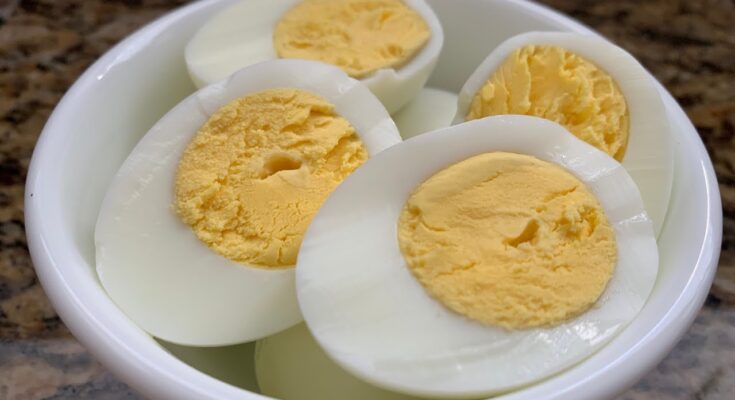Hard Boiled Eggs Recipe: Hard-boiled eggs are a staple in kitchens around the world. Whether you’re preparing a quick snack, making deviled eggs, or adding a protein boost to your salad, hard-boiled eggs are incredibly versatile. Learning how to boil them perfectly ensures you get consistently great results every time.
Let’s dive into a foolproof guide that will make you a hard-boiled egg pro in no time!
Ingredients Needed
Before starting, gather your materials. Here’s what you’ll need:
Ingredients:
- Eggs (as many as you need)
- Water (enough to submerge the eggs fully)
- Optional: Salt or vinegar for easier peeling.
Tools:
- A saucepan or pot
- A slotted spoon
- A bowl for an ice bath
- Timer
Having everything ready ensures a seamless process from start to finish.
Selecting the Right Eggs
Choosing the right eggs can make or break your boiling experience. Here are a few tips:
- Fresh vs. Older Eggs: While fresh eggs are excellent for frying or poaching, older eggs are easier to peel after boiling. If you’re planning to make hard-boiled eggs, opt for eggs that are 5-10 days old.
- Quality Matters: Always pick high-quality eggs from a trusted source. Free-range or organic eggs often have a better taste and texture.
Preparing the Eggs
Preparation is key to avoiding common issues like cracking. Here’s how to prep:
- Clean the Eggs: Rinse the eggs under running water to remove any dirt or debris.
- Prepare the Water: Fill your pot with cold water, ensuring there’s enough to completely submerge the eggs.
Boiling the Eggs
Now, the exciting part: boiling your eggs! Follow these steps:
- Arrange the Eggs: Place the eggs gently in the pot in a single layer.
- Heat the Water: Turn the heat to medium-high and bring the water to a rolling boil.
- Simmer the Eggs: Once boiling, reduce the heat to a simmer. Cover the pot with a lid.
Pro Tip: Adding a teaspoon of salt or a splash of vinegar to the water can make peeling easier later.
Timing for Desired Consistency
The cooking time determines whether your eggs are soft-boiled or hard-boiled. Use this guide:
- Soft-Boiled Eggs: 4-6 minutes for a runny yolk.
- Medium-Boiled Eggs: 7-9 minutes for a slightly firm yolk.
- Hard-Boiled Eggs: 10-12 minutes for a fully firm yolk.
Set a timer to avoid overcooking. Overcooked eggs can develop an unappetizing greenish-gray ring around the yolk.
Cooling the Eggs
Once the eggs are cooked to your liking, it’s time to cool them:
- Prepare an Ice Bath: Fill a large bowl with cold water and add ice cubes.
- Transfer the Eggs: Use a slotted spoon to move the eggs from the pot to the ice bath immediately.
- Let Them Sit: Leave the eggs in the ice bath for 10-15 minutes. This halts the cooking process and makes peeling much easier.
Peeling the Eggs Easily
Peeling hard-boiled eggs can be tricky, but these methods will save you time and frustration:
- Crack the Shell: Gently tap the egg on a hard surface to create small cracks all over.
- Roll and Peel: Roll the egg between your palms to loosen the shell. Peel under running water for extra ease.
Tip: Peeling is easiest when the eggs are slightly older or cooled completely.
Tips for Flawless Hard-Boiled Eggs
Perfect hard-boiled eggs don’t happen by chance—they’re the result of simple yet effective techniques. Here are some tips to help you achieve flawless results every time:
- Avoid Overcooking: Overcooked eggs not only have a rubbery texture but can also develop a green or gray ring around the yolk. Stick to the recommended cooking times for your desired yolk consistency.
- Even Cooking: Use a pot where eggs can sit in a single layer. This ensures they cook evenly and prevents crowding, which can lead to unevenly cooked eggs.
- Use a Simmer, Not a Rapid Boil: Keeping the water at a gentle simmer instead of a rolling boil prevents the eggs from bouncing around and cracking.
By following these tips, you’ll get eggs with bright, creamy yolks and firm whites every time.
Creative Ways to Use Hard-Boiled Eggs
Hard-boiled eggs are more than just a breakfast food. Here are some delicious ways to incorporate them into meals:
- Deviled Eggs: Scoop out the yolks, mix with mayonnaise and spices, and pipe them back into the whites.
- Egg Salad: Chop boiled eggs and mix with mayonnaise, mustard, and your favorite seasonings for a quick sandwich filler.
- Salad Toppings: Slice hard-boiled eggs and add them to salads for a boost of protein.
- Rice Bowls: Dice eggs and use them as a topping for rice or grain bowls.
- Snack on the Go: Simply sprinkle with salt and pepper for a portable snack.
These ideas highlight the versatility of hard-boiled eggs and ensure you never get bored with them.
Storage Tips for Hard-Boiled Eggs
Proper storage is essential to maintain the freshness and safety of hard-boiled eggs. Here’s what you need to know:
- Refrigeration: Hard-boiled eggs should always be stored in the refrigerator. Unpeeled eggs can last up to a week, while peeled eggs are best consumed within 3-5 days.
- Keep Them Covered: If you’ve peeled your eggs, store them in an airtight container with a damp paper towel to prevent them from drying out.
- Avoid Freezing: Freezing hard-boiled eggs isn’t recommended as the texture of the whites becomes rubbery upon thawing.
By following these tips, you’ll have fresh, delicious eggs ready for any meal.
Common Mistakes to Avoid
Even experienced cooks can run into issues when boiling eggs. Avoid these common mistakes:
- Starting with Boiling Water: Placing eggs into already boiling water can cause them to crack. Always start with cold water.
- Skipping the Ice Bath: Not cooling eggs quickly can lead to overcooked yolks and make peeling harder.
- Using Too Fresh Eggs: Fresh eggs tend to stick to the shell more, making peeling a nightmare. Use eggs that are slightly older for the best results.
Avoiding these mistakes ensures a smoother cooking process and better results.
FAQs about Hard Boiled Eggs Recipe
1. How long does it take to hard boil an egg?
It typically takes about 9-12 minutes to hard boil an egg. Start with cold water, bring it to a boil, then let the eggs cook in hot water. Adjust the time based on how firm you want the yolk to be.
2. Can I make hard boiled eggs in advance?
Yes, hard boiled eggs can be made in advance. Once cooled, they can be stored in the refrigerator for up to a week. Ensure they are kept in a covered container to avoid absorbing odors from other foods.
3. What is the best way to peel hard boiled eggs?
To peel hard boiled eggs easily, start by cooling them in ice water immediately after boiling. This contracts the egg from the shell. Crack the wider end of the egg first, then peel under running water to help loosen the shell.
4. Why do my hard boiled eggs have a green ring around the yolk?
The green ring around the yolk of a hard boiled egg occurs due to a chemical reaction between sulfur in the white and iron in the yolk when eggs are cooked for too long or at too high a temperature. To avoid this, cook eggs just until the yolk sets and promptly cool them in ice water.
5. Are there any tips for cooking large batches of hard boiled eggs?
When cooking large batches of hard boiled eggs, use a large pot to avoid overcrowding and ensure the water covers the eggs by at least an inch. Stir gently once the water is boiling to help the yolks settle in the center.
Conclusion
Mastering the art of making hard-boiled eggs is simple once you understand the basics. From selecting the right eggs to cooling them for easy peeling, every step contributes to perfect results. Whether you enjoy them as a quick snack or incorporate them into creative recipes, hard-boiled eggs are a versatile kitchen staple.
Give this method a try, and you’ll never look at boiling eggs the same way again!



